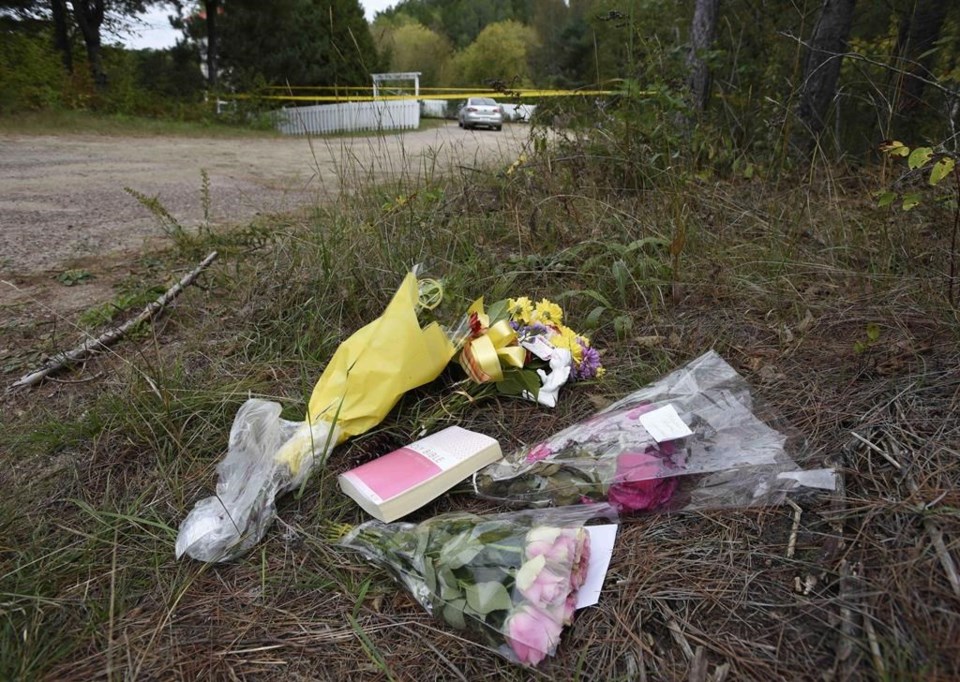Heather Imming considers herself to be fortunate.
Despite an imprint on her shoulder of the tire iron her late husband used to violently attack her at her Ottawa Valley home in 1994 and a brain injury she sustained in the attack, affecting her memory and ability to work to this day, Imming counts her blessings.
"One thing I really want people to understand is I was a fortunate one. I'm so fortunate because I've been able to continue to live life and I have seen my daughter grow up and become a really responsible, warm-hearted, giving young woman," she told a coroner's inquest Monday.
"I only survived because of everyone who was helping me."
The inquest is examining the deaths of three women killed by their former partner on Sept. 22, 2015 in the Ottawa Valley — Carol Culleton, Nathalie Warmerdam and Anastasia Kuzyk — and considering ways to protect victims of intimate partner violence, particularly in rural communities.
While emphasizing the importance for victims of intimate partner violence to have access to resources — like the women's shelter she leaned on in Lanark County — and support from neighbours, friends and community members, Imming took a moment to reflect on the deaths of Culleton, Warmerdam and Kuzyk.
"I wish, wish these women had had the level of support that I had," she said.
"It breaks my heart that they didn't."
Imming said as she was navigating her abusive relationship, workers from the Lanark County Interval House and Community Support shelter supported her through court proceedings and drove her to appointments related to her brain injury. They would even stop by her home on random occasions to bring her prepared meals, Imming added.
Members of her community banded together and dedicated themselves to watching her home every night to make sure she was safe after the violent attack with the tire iron, she said.
"When you have the supports of the police, of the Crown attorney's office, of your health-care system, of your community, of friends and neighbours, you can do it," Imming said. "But if any one of those parts are missing, there is a lapse. There really is a lapse."
Julie Lalonde, a women's rights advocate and public educator, also told the inquest that it's crucial for victims of intimate partner violence to have people and community resources they can count on.
But while many people know what intimate partner violence is and want to help others, Lalonde said they don't know how to respond to it, which is something that needs to change.
She recommended "robust" funding for public education initiatives to train Canadians on how to detect intimate partner violence and to adequately intervene, while noting that many people have misconceptions of intimate partner violence.
"People do care, but they're frozen, because they don't feel equipped," said Lalonde, who has lived experience of being stalked by a former partner.
"And so I think it's our job to put those tools in their hands."
Lalonde shared examples of some ways that people can help victims of intimate partner violence, such as helping them to document instances where they have been abused so that they have those details ready if they choose to pursue criminal charges against a perpetrator, and directly intervening to help a victim get out of a situation safely.
Increased funding for rural and remote sexual assault centres and shelters would also go a long way in supporting victims, she said.
Lalonde noted that these centres and shelters in rural communities have limited funds to work with, so workers are often stretched thin and unable to adequately support victims and get training on things like technology used by stalkers.
The inquest is set to resume Tuesday.
This report by The Canadian Press was first published June 20, 2022.
———
This story was produced with the financial assistance of the Meta and Canadian Press News Fellowship.
Noushin Ziafati, The Canadian Press

